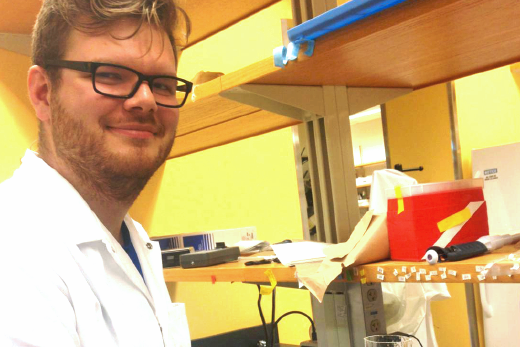This is a two-part feature on graduate students Crystal Grant and Daniel Desautels who were named Christine Mirzayan Science and Technology Policy Fellows by the National Academies of Sciences, Engineering and Medicine.
Part 2: Daniel Desautels
Daniel Desautels is one of two students from the Laney Graduate School participating in the National Academies of Sciences, Engineering and Medicine’s Christine Mirzayan Science and Technology Policy Graduate Fellowship Program in Washington, D.C. from Jan 21 to April 10.
The fellowship is named in honor of the late NAS Policy Fellow Christine Mirzayan, who was murdered before completing her fellowship to move on to the Association for the Advancement of Science’s Congressional Fellowship. Now the Mirzayan grant gives graduate students hands-on experience with the development of science and technology policy by way of research projects.
A student in the Population Biology, Ecology and Evolution (PBEE) program at LGS, Desautels studies how infectious diseases are affected by the environment with biology professor David Civitello’s Lab. Specifically, he is researching the relationship between invasive plants and parasitic worms called schistosomes or blood flukes, which cause schistosomiasis in humans.
“It’s one of the most pervasive neglected tropical diseases in the world,” Desautels said. “I want to understand how the plants affect how the disease spreads so we can learn how to manage the plants, which are a problem of their own…without inadvertently increasing the number of humans exposed to the disease.”
During his undergraduate studies in microbiology and life sciences communication at the University of Wisconsin-Madison, Desautels became interested in science policy while studying with a professor who encouraged him to combine his various areas of interest, such as biology, sociology and human health.
“All different types of things that I was interested in, look at big picture world problems,” Desautels explained. “I chose to do biology in graduate school to become an expert in my field and take that scientific knowledge into the policy world.”
The research Desautels conducts with his lab is a prime example of how policy and science intersect. One of the field sites where the Civitello Lab studies schistosomiasis is Lake Victoria in Kenya. While in Kenya, lab members have looked at the ways in which local communities manage invasive plant species.
“Here at Emory, I am replicating very small, hundred-liter versions of the lake and trying out different management protocols to see what the effect on human health will be,” Desautels explained. “A further step would be interacting with those communities, involving them in the process…”
According to Civitello, many of Desautel’s experiments are difficult to pull off, and while Desautels’ work will not necessarily be implemented as a policy, developing an effective means to manage the invasive plants will require Desautels to take into account the social, cultural and economic factors that will impact the communities around Lake Victoria before the residents use the management techniques.
“His interest in the project is fueled by his broader interest to connect science and policy, and that really motivates him to pull off these tough experiments,” Civitello said. “My main goal is to help students identify their career goals and the freedom to pursue important early career training experiences. Dan earned this opportunity against a competitive field of applicants, and I know it will impact his career in science policy.”
Gaining hands-on experience of how all of these political factors come together is Desautels’ next step as he prepares to work with the NAS’s Committee on Population.
He will be working on three separate projects that will focus on the increase of mid-life mortality, the implications of an aging workforce, and health outcomes for LGBTQ youth in the U.S. Most of the scientific work for the LGBTQ youth project has already been completed, so Desautels will work on writing up the final policy recommendations and the research summary.
But his other two assignments will be more intensive.
“Our goal is to work on all three so that I can see what goes into these projects at different stages for a breadth of understanding so that, in the future, I can pinpoint what aspects of science policy interest me,” Desautels said.
At Wisconsin-Madison, Desautels participated in science outreach programs with his lab, working in conjunction with Wisconsin Science Festival through Wisconsin-Madison’s Institute of Discovery to host “science nights” for elementary school students. Desautels sees the Mirzayan Fellowship as an avenue to become more involved in science advocacy.
Desautels believes scientists should be more active in politics. Demonstrations like 2017’s the March for Science are one example of advocacy in which he would like to see members of the scientific community participate. For him, the generation of knowledge through science takes on a new life once it has been published.
“The science has to go out into the world and into society and affect everyone’s everyday lives,” Desautels said. “Even if you don’t go into science policy, just understanding how your science affects policy can help you be a better scientist and…be mindful of the connections your work has with other aspects of society.”

